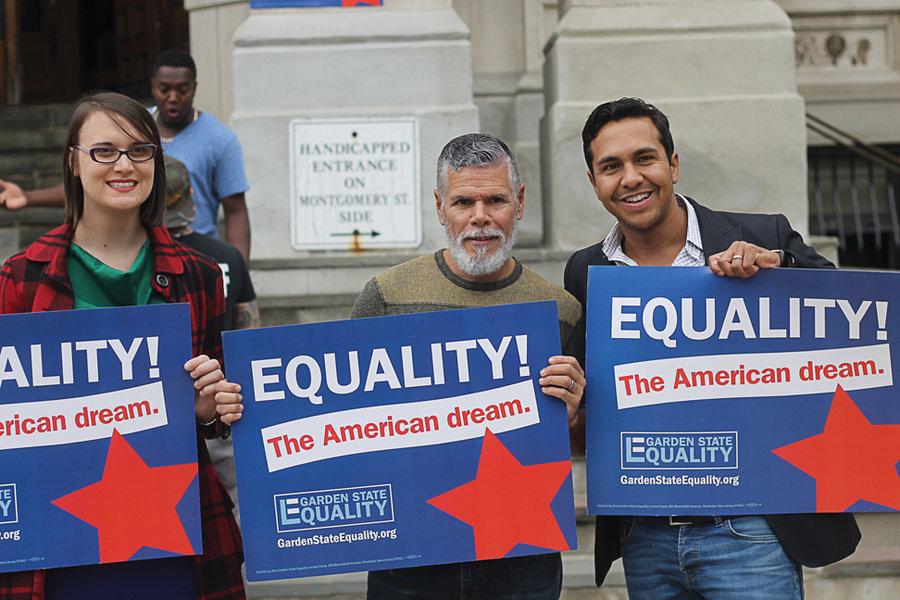Even though she won’t benefit, Clara (not her real name) was thrilled at the news that Jersey City will become the first municipality in New Jersey to offer trans-inclusive health benefits to city employees. “I think it’s fantastic,” said Clara. She’s a 31 year-old transgender person from Hudson County, but not an employee of the city.
Stress over health issues can be overwhelming, she said, and transgender people have significant medical and financial issues that the extended insurance coverage would help resolve.
“I handle stress well, but many do not,” she said.
Mayor Steven Fulop announced on Sept. 23 that Jersey City would expand the health care coverage it offers city employees to include coverage for transgender medical care and related procedures, including gender affirmation surgery.
When the change takes effect at the beginning of 2016, Jersey City will become the first large city in the state to offer such coverage and one of only a handful across the country.
“Government has a responsibility to be a legitimizing force, to pull people in the direction of what is right, especially on LGBT issues,” Fulop said. “We’re doing that in Jersey City: We’re making sure that our transgender neighbors get the care they need.”
Jersey City joins a small but growing list of American cities – including San Francisco, Portland, Seattle, and Austin – to ensure its transgender employees have equal access to health care.
Nationwide, two in ten transgender Americans are denied health care because of who they are.
One in three face significant delays getting necessary medical attention. This lack of access to care can have serious negative consequences, including depression and suicide.
“Jersey City is doing what every municipality in New Jersey must do: provide medically necessary transition-related care to its employees.” – Andrea Bowen
____________
“Jersey City is doing what every municipality in New Jersey must do: provide medically necessary transition-related care to its employees,” said Andrea Bowen, an activist and the Executive Director of Garden State Equality. “Jersey City is leading the way in showing how to improve the lives of transgender people, and Garden State Equality is honored to have worked with Mayor Fulop and his staff on this great reform.”
“The American Medical Association, the US Department of Health and Human Services, and all of mainstream medicine support ending discrimination against transgender people,” said Barbra Siperstein, director of the Gender Rights Advocacy Association of New Jersey. “As a native of Jersey City, on behalf of the Gender Rights Advocacy Association of NJ, I take particular pride in congratulating Mayor Steven Fulop and the City of Jersey City for taking the leadership in being the first New Jersey municipality to provide medically necessary transition-related care for its employees.”
The city’s health care providers estimate the cost of expanding coverage for transgender care to be very small: roughly one tenth of one percent of the current cost of healthcare for the city. Fulop estimated the cost to the city between $100,000 to $500,000 annually.
As happy as Clara is about the news in Jersey City, she is realistic about it being applied elsewhere in the state and nation.
“I think it would be great if other counties did (this, too),” Clara said. “But I don’t think they will just because Jersey City is doing it. I think each county will consider the practical and moral aspects of it and decide for themselves. Of course, I think the best thing would be regulated nationally to be covered by all insurance. The problem with doing any additional coverage locally is people who need the care try to move to those areas/jobs and it causes a price spike in premiums for everyone locally.”
More than just an insurance issue
Clara said the lack of health insurance for transgender people is a huge problem, partly because many face other health issues, and partly because many need guidance from a trained physician to get through the complicated regimen of hormones and other drugs.
Lack of doctors trained to deal with the transgender population is nearly as problematic.
While there appear to be plans for Horizon Healthcare, a medical group in Jersey City, to develop a Jersey City capacity to deal with this issue, many transgender people either have to travel to New York or as far south as Toms River to get the necessary treatment.
Self-medicating by purchasing these hormones on the internet poses health risks, Clara said. Estrogen treatments, testosterone reduction and other drugs can have dangerous side effects unless administered by a doctor.
“Most doctors are not trained in transgender medicine,” she said. She knows because she’s been to a number of local doctors.
“I went to primary doctors and they looked at me like I had three heads,” she said. “Everybody wants to provide primary care, but there are other things they just don’t do.” Often transgender people have to pick and choose services.
For Clara, estrogen treatment poses yet another risk. “My grandmother had breast cancer. This increases my chances of getting breast cancer. I have to be monitored, something that does not happen with self treatment.”
She didn’t get personal health insurance until the federal Affordable Care Act began to offer it.
“I was one of the first to sign up for it,” Clara said. “I used to live paycheck to paycheck. But I’m very conscious about my credit.”
Lack of insurance could drive transgender people deep into debt, especially if they have other health problems.
Clara said she worked hard to keep good credit. Having insurance benefited her and allowed her to help get her mother a loan to start a business.
“It is life changing to have insurance,” she said
Al Sullivan may be reached at asullivan@hudsonreporter.com.
